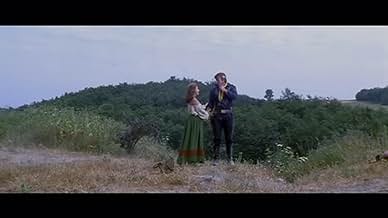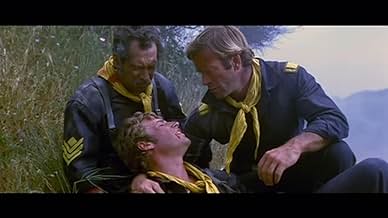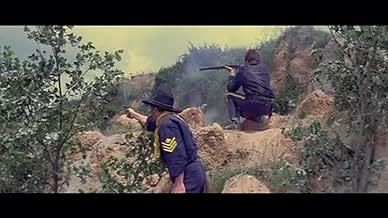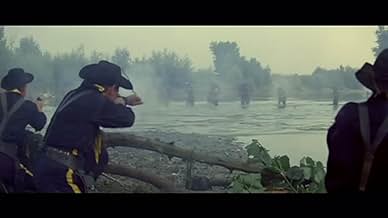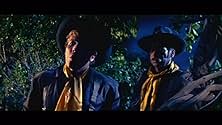Füge eine Handlung in deiner Sprache hinzuA lone rider comes across a dying soldier, who gives him a paper authorizing the payment of $150,000 to the U.S. Army. The rider gathers some colleagues who disguise themselves as soldiers a... Alles lesenA lone rider comes across a dying soldier, who gives him a paper authorizing the payment of $150,000 to the U.S. Army. The rider gathers some colleagues who disguise themselves as soldiers and who take the paper to a bank.A lone rider comes across a dying soldier, who gives him a paper authorizing the payment of $150,000 to the U.S. Army. The rider gathers some colleagues who disguise themselves as soldiers and who take the paper to a bank.
- Slim Kincaid
- (as Kirk Bert)
- Sergeant Warwick
- (as Dean Ardow)
- …
- Captain Hull
- (as Anthony Gradwell)
- …
- Mr. Silver
- (Nicht genannt)
- Sandy-Haired Gambler
- (Nicht genannt)
- Bartender
- (Nicht genannt)
Empfohlene Bewertungen
Anyway, the movie under review is considered among Bava's minor efforts – and rightly so; yet, it is nowhere near as bad as some make it out to be and, to my mind, preferable to his comedy-oriented last entry in the field, namely ROY COLT AND WINCHESTER JACK (1970; with which, as it happens, I will be re-acquainting myself presently). As I said, the film mainly looks to the American model – albeit following its more routine examples – for inspiration, but that is not necessarily a bad thing. Interestingly, Bava starts off proceedings with an inconsequential 'prologue' (featuring favourite "Euro-Cult" villain Gerard Herter) involving a crooked card game and an amusingly sleepy bartender. Rugged (and immensely hirsute) hero Ken Clark – who would return for the recently rewatched SAVAGE GRINGO (1966), which Bava helmed albeit without credit – is a Southern landowner who lost everything to a Northern onslaught during the Civil War, and whom he now plans to get back at by posing as a Union officer and 'withdraw' a cache of money from the bank destined to the enemy forces! Unluckily for him, the associates he picks up for the job – led by another familiar face, Michel Lemoine – prove greedy and leave him and his closest ally for dead or, more precisely, at the mercy of the marauding Osage Indians!
Eventually, the two men are saved by a Southern Army wagon train bound for the titular outpost so that they are forced to keep up the military disguise; ironically, they are soon joined by Lemoine himself, the sole survivor of the renegade gang who also had a brush with the redskins but is still in possession of half the stolen sum. Clark, whose uniform bears the higher rank, now delights in rubbing his treacherous ex-partner the wrong way – but, in fact, neither has given up on the loot and each intends making off separately with it at some point. However, the Osage come down en masse on the small unit (which includes a by-the-book Colonel, a wily Second-in-Command soon in on Clark's ruse but willing to keep it to himself, the priggish wife of the Colonel at the fort and even a female prisoner – earthy redhead Jany Clair naturally comes to fall for the brawny charms of, and senses a misfit kinship with, our protagonist – being escorted there for trial) and they have to stay on and fight it out! A nice touch has the Indians make flower arrangements via the 'confiscated' paper money (which to them is useless) and send them floating down river in order to lure avaricious soldiers out into the open and slay them; this idea then comes into play again at the inevitable showdown between Clark and Lemoine.
While Bava was clearly ill-at-ease within this particular genre (unflatteringly billed in this instance as John Old), here at least he incorporates his recognizable colour palette to effective use; Carlo Savina's score, then, includes the token ballad warbled over the opening credits and, surprisingly, cues which bear an uncanny resemblance to those composed for the soundtrack of the 1957 Mexi-Horror classic THE VAMPIRE!
It's not the greatest or most original film, but it kept me entertained and my biggest complaint is with regards to the 'romantic' subplot and its cheesy accompanying music (at least on the copy I saw, I'm not sure if it was or wasn't the original music used). Bava isn't always at his best when trying to provide romance/love interests to his films. Black Sunday (La Maschera del demonio) is IMHO the quintessential Italian Gothic horror film and a favorite of mine, but even his admirers have to admit that in that great film, the 'undying love' of the young Dr. Gorobec for Katia -- whom he has just met one day previous -- is a bit silly and one-dimensional and at times almost laughably overly melodramatic. I took off one point for the botched romance portions of Arizona Bill, though I did like it overall more than Nebraska which ended up with the same 5/10 score from me.
The copy of the film I saw was an English language widescreen version from an old somewhat glitchy videotape source with a runtime closer to the USA or German cuts. I'm not sure what was excised from the original 90 minute cut listed on IMDb and maybe when TL's big Bava book comes out it will tell us what is or isn't missing from the cut I saw, but I hope one of the cult DVD companies (like Image, Anchor Bay or Blue Underground) pick up both this title and "Nebraska Jim" sometime in the near future to provide Bava's fans with a good legitimate uncut DVD release with the best transfer possible considering whatever film elements exist. I'm sure the underrated director's fans would welcome quality releases of all his films, even the lesser known and hard to find ones where Mario took over directorial duties from a previous director leaving a project.
I give it 4 out of 10.
This is an ordinary Western about a simple and plain plot in which has great importance the regular confrontation between Cavalry and Indians . This good-natured Pasta Western contains thrills , romance , shootouts , crosses and double-crosses and action enough. It results to be quite entertaining but middling . Stars Ken Clark as an ambitious lone rider falling in love for beautiful Jany Clair and thanks to her he finds redemption, both of whom also starred Agent Secret FX 18 (1964) . Ken Clark was one of many American hunk men as Steve Reeves , Gordon Scott , Reg Park, Mark Forest , Reg Lewis, Dan Vadis , Rock Stevens , Lou Ferrigno, emigrated to Italy to play a Sword and Sandals or Peplum movies , though none of them topped in popularity to Steve Reeves . As Ken Clark getting a certain success in Peplum , and Euro-spy genre . Here Ken Clark is accompanied by a functional support cast , but none of them are known Western secondaries , exception for Gerard Herter who starred some classic Spaghetti Western . I miss the familiar faces regular in Spaghetti/Chorizo sub-genre . In "Road to Fort Alamo" stands out the splendid photography by Ubaldo Terzano and Mario Bava himself , full of brilliant blue and yellow colors, being shot in Elios studios , and exteriors from Lazio , Rome . As well as atmospheric musical score in Spaghetti style by Piero Umiliani.
The picture was regular but professionally directed by Mario Bava. He was the main creator of Italian Giallo genre , Bava (Blood and Black Lace, House of Exorcism, Black Sabbath) along with Riccardo Freda (Secret of Dr Hitchcock) and subsequently Dario Argento (Suspiria, Tenebre , Phenomena) are the fundamental representatives .In fact , Bava and Freda had a long collaboration , as Bava finished two Riccardo's films : Il Vampiri and Caltiki . These Giallo movies are featured by overblown use of color in shining red blood, usual zooms, and regular images-shock. Bava made all kinds of genres , such as Scifi : "Planet of vampires" , Peplum : "Hercules in the Center of Earth" , "Battle of Marathon", Historical : "Erik the Conqueror", "Viking massacre"and Spaghetti Western : "Roy Colt and Winchester Jack", "Ringo From Nebraska" codirected by Antonio Roman and this "Road to Fort Alamo". The movie will appeal to Mario Bava enthusiasts and completists.
Wusstest du schon
- PatzerBill rides up to dead soldiers at the beginning. He resumes riding in the direction he was going, but in the next shot the scenery is that of the opposite direction - where he'd just been.
- Zitate
[surrounded by Ozark Indians]
Bud Massedy: We've no hope at all.
- VerbindungenReferenced in Mario Bava: Maestro of the Macabre (2000)
- SoundtracksThe Way To Alamo
Performed by Tony Wendell

